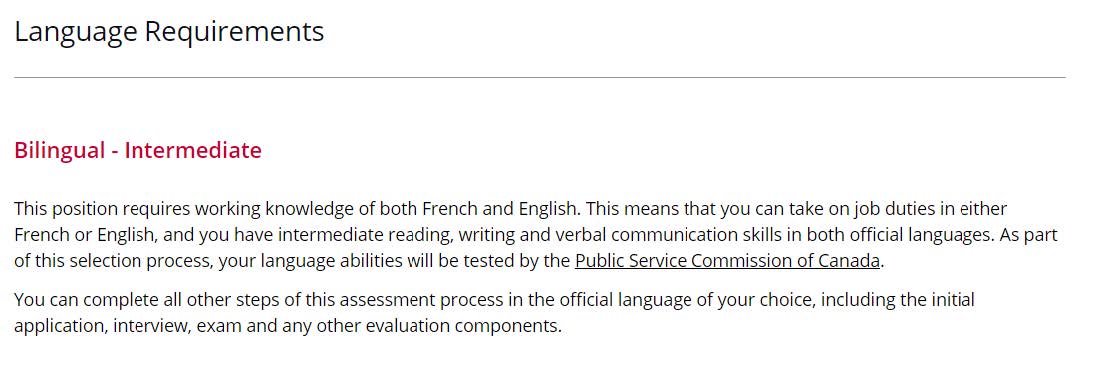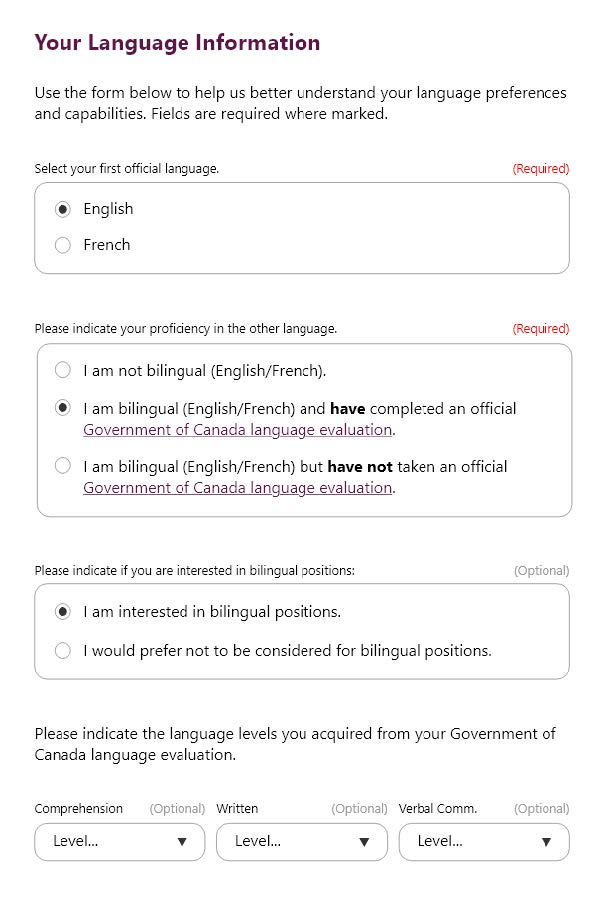In our user research, many applicants reported that they found the official language requirements confusing in government job advertisements. With the proficiency level usually described as CBC or BBB, applicants who were new to government had many challenges in understanding what was required of them, and whether or not their level of language ability would be sufficient to succeed in the job.
Managers also reported concerns with this element of the screening process, expressing that applicants tended to overestimate their bilingual capacity. This was resulting in managers selecting promising applicants who didn’t end up meeting the language requirement. As second language evaluation (SLE) usually took place after a few candidates had been shortlisted, when these candidates failed the SLE, uncertainties and delays were created in the staffing process. Managers sometimes had to go back to their applicant pool several times, only to find that other top applicants had already moved on to other offers.
Those who do not meet the necessary language requirements will not apply to bilingual positions if:
Talent Cloud initially identified two areas of intervention related to official languages that could be easily added to the platform design: changing the way information was provided in a job advertisement and adding a nudge. These were tested live with numerous Talent Cloud processes. Talent Cloud tested these interventions with users in mock processes, and then tested to see what would happen in live processes.
Following the initial findings in 2019, Talent Cloud decided to test a third intervention in 2020: adding a language self-declaration form on the job application. This was tested with users in mock processes, but has not yet been released for testing on a live job advertisement.
Language requirements in simple language: On job advertisements, information about the language requirements was rewritten in simple language and described in a way that could be understood by applicants from various backgrounds, including those completely new to government jobs. A link to the Public Service Commission website on second language evaluation was included for those interested in learning more about the evaluation or taking the self-assessment.

Official language capacity confirmation: In order to discourage those who didn’t have the required official language capacity from applying, a behavioural nudge was added to the application process to ensure that applicants fully understood that they would absolutely need to meet the language requirements in order to be considered for the position. Before they could submit their application, applicants needed to tick a box confirming that they had the required language capacity in order to proceed.
Official Language declaration form: Based on observations on how managers and HR advisors utilized information about applicants’ official language capacity in real staffing processes, a new Official Language declaration form was developed. Users had the option to describe their official language capacity, while managers could access the information in a way that supported them in making staffing decisions (framed in the context of Government of Canada language levels).

Of all the questions we received from applicant portal users, which ranged from inquiries about specific job advertisements to general technical questions, none was related to the language requirements.
That said, there were still a few instances where applicants over-estimated their language levels, despite the clearer language on the job advertisement and the nudge against overclaiming. In these cases, the applicants had some ability in their second language, but didn’t have a benchmark to understand how well this would translate to Government language around CBC or BBB. This indicates the need for the inclusion of further interventions.
The Official Language declaration form Talent Cloud designed received positive feedback during user testing. It can hopefully be integrated into use in the future, and tested as a potential solution to the issue of misaligned applicant self-assessment of language levels.
Talent Cloud users repeatedly reported that clarity of information presented on job advertisement was an important factor in motivating them to apply for opportunities. It was important to ensure information was communicated in a way that could be easily understood, especially for users who had never previously applied to government jobs.
As language requirements are key information on government job opportunities, Talent Cloud demonstrated that various interventions can be implemented to ensure applicants clearly understand what was required of them. These interventions can also contribute to reducing time to staff by helping deter potential applicants who do not have the required official language capacity.